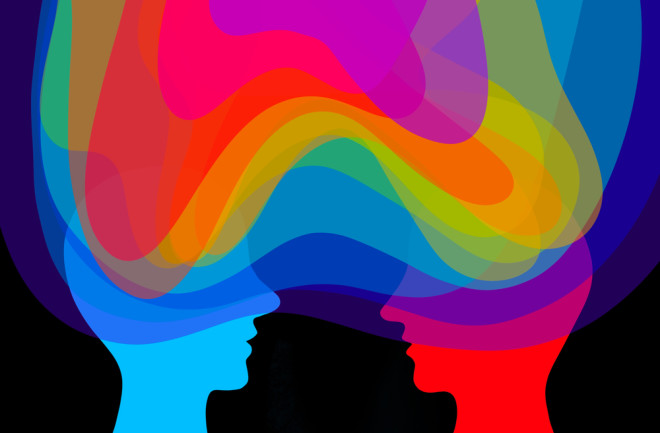Showing posts with label Brains. Show all posts
Showing posts with label Brains. Show all posts
Monday, May 8
Years Ago Human Brains Changed Forever
Like treasured recipes passed down from generation to generation, there are just some regions of DNA that evolution doesn't dare tweak. Mammals far and wide share a variety of such encoded sequences, for example, which have remained untouched for millions of years.
Humans are a strange exception to this club. For some reason, recipes long preserved by our ancient ancestors were suddenly 'spiced up' within a short evolutionary period of time.
Because we're the only species in which these regions have been rewritten so rapidly, they are called 'human accelerated regions' (or HARs). What's more, scientists think at least some HARs could be behind many of the qualities that set humans apart from their close relatives, like chimpanzees and bonobos.
Led by computational biologist Katie Pollard, director of the Gladstone Institute of Data Science and Biotechnology in the US, a team of researchers identified HARs nearly two decades ago while comparing human and chimpanzee genomes.
In a new study, Pollard's team found the 3D folding of human DNA in the nucleus is a key factor in this pivotal moment for our species.
Imagine a length of DNA from our last common ancestor with chimpanzees as a long scarf wrapped around your neck, with stripes of various colors running across its weave down its entire length.
Now picture someone tried to make the exact same scarf, but they didn't quite follow the original pattern. Some of the stripes are narrower, some are wider, and some feature colors in a different order than the original. READ MORE...
Wednesday, July 6
Where Do Our Minds Go?
After experimenting on a hen, his dog, his goldfish, and himself, dentist William Morton was ready. On Oct. 16, 1846, he hurried to the Massachusetts General Hospital surgical theater for what would be the first successful public test of a general anesthetic.
His concoction of sulfuric ether and oil from an orange (just for the fragrance) knocked a young man unconscious while a surgeon cut a tumor from his neck. To the onlooking students and clinicians, it was like a miracle.
Some alchemical reaction between the ether and the man’s brain allowed him to slip into a state akin to light sleep, to undergo what should have been a painful surgery with little discomfort, and then to return to himself with only a hazy memory of the experience.
Monitoring patients’ brains still isn’t something that medical boards require.
General anesthesia redefined surgery and medicine, but over a century later it still carries significant risks. Too much sedation can lead to neurocognitive disorders and may even shorten lifespan; too little can lead to traumatic and painful wakefulness during surgery.
Monitoring patients’ brains still isn’t something that medical boards require.
General anesthesia redefined surgery and medicine, but over a century later it still carries significant risks. Too much sedation can lead to neurocognitive disorders and may even shorten lifespan; too little can lead to traumatic and painful wakefulness during surgery.
So far, scientists have learned that, generally speaking, anesthetic drugs render people unconscious by altering how parts of the brain communicate. But they still don’t fully understand why. Although anesthesia works primarily on the brain, anesthesiologists do not regularly monitor the brain when they put patients under.
And it is only in the past decade that neuroscientists interested in altered states of consciousness have begun taking advantage of anesthesia as a research tool. “It’s the central irony,” of anesthesiology, says George Mashour, a University of Michigan neuroanesthesiologist, whose work entails keeping patients unconscious during neurosurgery and providing appropriate pain management.
Mashour is one of a small set of clinicians and scientists trying to change that. They are increasingly bringing the tools of neuroscience into the operating room to track the brain activity of patients, and testing out anesthesia on healthy study participants.
Mashour is one of a small set of clinicians and scientists trying to change that. They are increasingly bringing the tools of neuroscience into the operating room to track the brain activity of patients, and testing out anesthesia on healthy study participants.
These pioneers aim to learn how to more safely anesthetize their patients, tailoring the dose to individual patients and adjusting during surgery. They also want to better understand what governs the transitions between states of consciousness and even hope to crack the code of coma. READ MORE...
Friday, July 30
Brains and Consciousness
PLANET EARTH
MIND
Brains Might Sync As People Interact — and That Could Upend Consciousness Research
When we cooperate on certain tasks, our brainwaves might synchronize. This finding could upend the current understanding of consciousness.
By Conor FeehlyJul 26, 2021 7:00 PM

(Credit: Katya Kovarzh/Shutterstock
People synchronize in various ways when we interact with one another. We subconsciously match our footsteps when we walk. During conversations, we mirror each other's postures and gestures.
To that end, studies have shown that people synchronize heart rates and breathing when watching emotional films together. The same happens when romantic partners share a bed. Some scientists think we do this to build trust and perceive people as similar to ourselves, which encourages us to behave compassionately.
Surprisingly, people synchronize their neural rhythms, too. Researchers like Tom Froese, a cognitive scientist from the Okinawa Institute of Science and Technology in Japan, think that these findings could upend our current models of consciousness. READ MORE
Subscribe to:
Comments (Atom)

